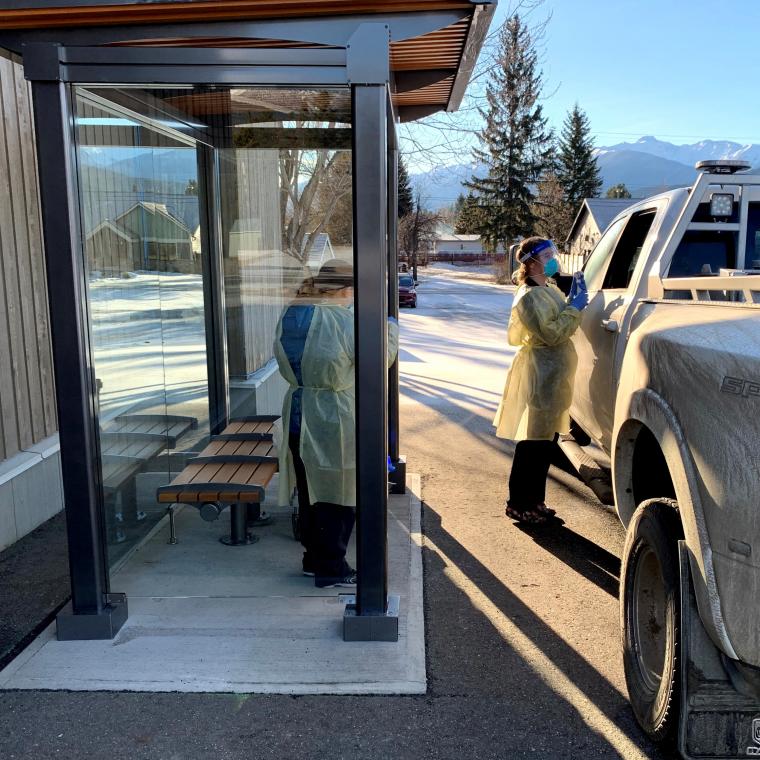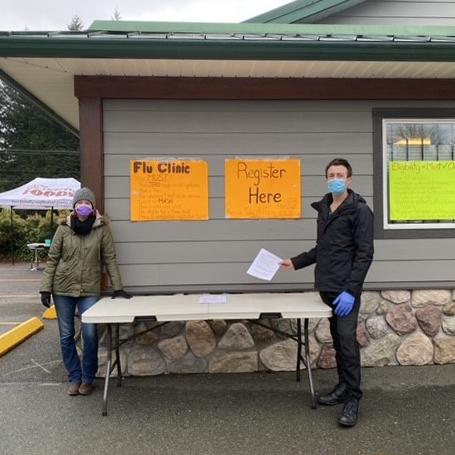With the arrival of the COVID-19 vaccine in BC, attention will turn to planning on how to safely immunize all British Columbians. Widespread vaccination is months away for the general population, but doctors around the province are busy administering flu vaccines and providing patient care, using innovative solutions to deal with challenges posed by COVID-19. Today we are profiling doctors in two small, rural communities – Valemount in the North and Oyster River on the Island.
Doctors in Valemount get creative to deliver patient care outdoors – in cold winter weather

Family physicians in the Northern Interior Rural Division of Family Practice serve small, diverse communities with unique needs. As the pandemic began, the division and other stakeholders worked fast to determine innovative solutions – emphasizing physician-led primary care initiatives that would lead to better patient care, and greater wellbeing for physicians and clinic staff. According to division projects lead, Candice Smit, “everybody sat at the table and figured out what the need was going to be.”
In northern BC, collaboration was key to get these ideas off the ground. One such idea came from doctors at Valemount Health Centre, including Dr James Card. He explained how they reexamined clinic waiting areas. “You’ve got your sick patients, sick from chronic disease, and immune suppression, sitting next to your infectious patients. The pandemic forced us to have a look at that.”
Since the pandemic began, Dr Card and his colleagues had been running outdoor daily clinics for anyone with infectious symptoms so that they didn't mingle with immunocompromised people in their waiting areas, but faced a challenge as a northern winter loomed ahead – an outdoor clinic in below-freezing temperatures was not a pleasant prospect. With the help of Valemount site manager Kim Nordli, they figured out a way to safely assess patients with infectious symptoms outside of the main clinic buildings, while protecting healthcare workers from the elements – drive-through outdoor assessment shelters.
After research and discussion with various communities within the division, three shelters were successfully erected in Valemount, Mackenzie and McBride. The idea is to provide optimal patient care, while sheltering clinic staff from the bitter winter. Dr Card explained: “The nurses are out there with all of their gear. The idea is the shelter is three-sided, and the patients vehicle as they pull up makes the fourth side of the structure, keeping them and their gear dry.” The shelter keeps staff comfortable, and residents are able to have their infectious symptoms thoroughly examined while protecting more compromised community members.
Susanna Gasser, one of four primary care nurses at the Valemount Health Centre, said:
“We wear many hats and one of them is being part of our outdoor cold and flu clinic, where certain clients are assessed and COVID testing is offered by a doctor and a nurse, supported by a PCA (Primary Care Assistant). The shelter allows us to “step inside” and warm up somewhat while preparing for the next client.”
Setting up an outdoor project like this one in northern BC is no small feat, but Dr Card is hopeful that this method is something that will continue long into the future, once we emerge into a post-COVID-19 world. Of course, there will be adjustments along the way, but “Even with COVID-19 off the table, the flu and the common cold are still out there, and that is a danger to a lot of our patients.”
Oyster River doctors bring safe and efficient flu clinic to locals

On Vancouver Island, family doctors in the Campbell River and District Division of Family Practice have been hard at work providing flu immunizations to residents. Many doctors in the community have been striving to immunize communities across the division, from mass clinics to drive-through projects.
At the Bridge Medical Clinic in Oyster River, physicians and clinic staff have collaborated on a systematic, COVID-19-safe outdoor clinic, that has seen huge success so far. Dr Eben Nel of the Bridge Clinic explained why they approached this flu season with local residents’ needs in mind. “We realized that our community is in between Campbell River and Courtenay and we have a lot of people that really focus on staying in their bubble and avoiding unnecessary contact with different communities. They come to the centre for groceries and go back home.” With so many residents prioritizing staying close to home, a central and local immunization hub was needed.
The staff designed an outdoor, physically-distanced flu clinic, which has been running on Saturdays – immunizing 90 people in a little more than two hours on average. Using a canopy and heater to keep comfortable in the chilly weather, doctors are set up with pre-drawn flu injections that they need to smoothly move people through the process. Patients must wear a mask, be in good health, eligible for the free injection, bring their own pen, their care card, and be wearing a short or no sleeve shirt. They are also asked to fill out a form ahead of time, along with COVID-19 screening questions. After being immunized, people remain in the vicinity for 15-20 minutes, in case they need to present to the walk-in clinic due to an allergic reaction to the vaccine.
Teamwork was the foundation for this initiative, says Dr Nel, noting that the innovative setup also helped offset the burden on the clinic’s admin team, and freed up doctors to spend time in-clinic on patients with more complex care needs. Patients also felt informed ahead of time, boosting uptake.
Dr Nel said the clinics are a very good passive promotion of preventative care both for the vaccine itself, and for patient care in a physically distanced way. The promotion of the flu clinic in the community also meant people who didn’t plan on getting the vaccine got their flu shot. “It’s definitely something we will build on - we had good feedback from the patients and other healthcare providers in the area.”
